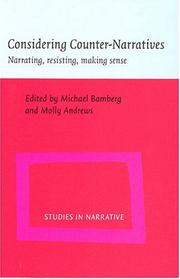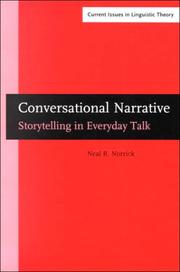| Listing 1 - 10 of 33 | << page >> |
Sort by
|
Book
ISBN: 9782845167544 2845167547 9782845167551 2845167555 Year: 2017 Publisher: Clermont-Ferrand
Abstract | Keywords | Export | Availability | Bookmark
 Loading...
Loading...Choose an application
- Reference Manager
- EndNote
- RefWorks (Direct export to RefWorks)
Les contes de Perrault, des frères Grimm, et d'Andersen sont parmi les plus connus du genre, mais leur rapprochement masque parfois le fait qu'ils n'ont pas été écrits à la même époque, ni dans la même culture, et qu'ils comportent de nombreuses différences. Avec une double approche linguistique et comparatiste, l'ouvrage propose un nouveau regard sur ces textes et s'attache à montrer que les auteurs construisent des manières de raconter particulières, des stratégies narratives qui doivent être mises en relation avec un « projet discursif ». L'analyse des différences entre Perrault, les Grimm et Andersen permet en outre de construire une poétique du genre : le conte apparaît comme un enchevêtrement de voix où un conteur relate une histoire déjà racontée auparavant, comme s'il rapportait la voix d'un autre conteur, s'inscrivant ainsi dans une tradition où l'on parle toujours à la suite de quelqu'un.
Contes. --- Analyse du discours narratif --- Histoire et critique --- Perrault, Charles --- Grimm, Jacob --- Grimm, Wilhelm --- Andersen, Hans Christian --- Style --- Style. --- Contes --- Analyse du discours narratif. --- Histoire et critique.

ISBN: 0253055881 9780253055880 0585103046 9780585103044 0253331439 9780253331434 Year: 1991 Publisher: Bloomington
Abstract | Keywords | Export | Availability | Bookmark
 Loading...
Loading...Choose an application
- Reference Manager
- EndNote
- RefWorks (Direct export to RefWorks)
Examining the constitutive role of language and narration in key areas of human experience, Narrative and the Self articulates a view of the self as the implied subject of narrative utterances. Anthony Paul Kerby draws on the diverse insights of recent work in philosophy, literary theory, and psychology to synthesize a coherent and provocative view of narrative identity and selfhood. Invoking the writings of Benveniste, Ricoeur, Merleau-Ponty, Lacan, Taylor, and other theorists, he argues that language and narration play a central role in key aspects of human experience such as emotion, values, recollection, and sense of history. Fundamental to Kerby's exposition is a defense of the quasi-narrative nature of our every- day experience. Kerby delineates a convincing narrative model of the self and offers a valuable overview of contemporary philosophical issues surrounding the place and role of narrative in human experience.
Discourse analysis, Narrative. --- Language and languages --- Philosophy. --- Narration (Rhetoric) --- Philosophy --- Langage et langues --- Moi (Philosophie) --- Discours narratif. --- Self (Philosophy) --- Philosophie.
Book
ISBN: 9789027256034 9789027287700 9027256039 9027287708 1282904582 9786612904585 9781282904583 6612904585 Year: 2010 Publisher: Amsterdam John Benjamins
Abstract | Keywords | Export | Availability | Bookmark
 Loading...
Loading...Choose an application
- Reference Manager
- EndNote
- RefWorks (Direct export to RefWorks)
In this paper, we show how the intersection of chains of multimodal cohesive ties with choices of relations among sequences of filmic units provides a strong foundation for constructing filmic narrative. Until now bridging the gap between narrative concerns and fine-grained analysis of complex multimodal artefacts such as films has been difficult: fine-grained analyses tend to lose themselves in the wealth of detail revealed and high-level narrative analyses are often pulled towards subjective interpretations. Our definition and use of the constructs of multimodal filmic cohesion and of logical sequential filmic relations establishes functional analytic categories anchored both below, in the fine-grained detail of film, and above, in the range of interpretations that they delimit. We propose this as one way in which we can move towards a more empirically-grounded notion of transmedial narration.
Literary rhetorics --- Pragmatics --- Narration (Rhetoric) --- Discourse analysis, Narrative --- Digital media --- Narration --- Discours narratif --- Médias numériques --- Congresses. --- Congresses --- Influence --- Congrès --- LANGUAGE ARTS & DISCIPLINES --- Communication Studies --- Languages & Literatures --- Literature - General --- Electronic media --- New media (Digital media) --- Mass media --- Digital communications --- Online journalism --- Narrative discourse analysis --- Médias numériques --- Congrès --- Rhetoric --- Narratees (Rhetoric) --- Analyse du discours narratif

ISBN: 902722644X 1588115429 9786612160158 128216015X 9027295026 9789027295026 9781588115423 9781282160156 9789027226440 6612160152 Year: 2004 Volume: 4 Publisher: Amsterdam Benjamins
Abstract | Keywords | Export | Availability | Bookmark
 Loading...
Loading...Choose an application
- Reference Manager
- EndNote
- RefWorks (Direct export to RefWorks)
Counter-narratives only make sense in relation to something else, that which they are countering. The very name identifies it as a positional category, in tension with another category. But what is dominant and what is resistant are not, of course, static questions, but rather are forever shifting placements. The discussion of counter-narratives is ultimately a consideration of multiple layers of positioning. The fluidity of these relational categories is what lies at the center of the chapters and commentaries collected in this book. The book comprises six target chapters by leading scholars in the field. Twenty-two commentators discuss these chapters from a number of diverse vantage points, followed by responses from the six original authors. A final chapter by the editor of the book series concludes the book.
Analyse du discours narratif --- Discours narratif -- Analyse --- Discourse analysis [Narrative ] --- Narratieve teksten -- Tekstgrammatica --- Narrative discourse analysis --- Teksten [Narratieve ] -- Tekstgrammatica --- Teksten [Verhalende ] -- Tekstgrammatica --- Textes narratifs -- Analyse du discours --- Verhalende teksten -- Tekstgrammatica --- Literary rhetorics --- Sociolinguistics --- Discourse analysis, Narrative. --- Discourse analysis. --- Discourse grammar --- Text grammar --- Semantics --- Semiotics --- Narration (Rhetoric)
Book
ISBN: 9782753521735 2753521735 275355756X Year: 2013 Volume: *115 Publisher: Rennes : Presses universitaires de Rennes,
Abstract | Keywords | Export | Availability | Bookmark
 Loading...
Loading...Choose an application
- Reference Manager
- EndNote
- RefWorks (Direct export to RefWorks)
Dans Figures de l'étranger dans la littérature française, Abdelkebir Khatibi place Marguerite Duras aux côtés de Segalen, de Jean Genet et de Roland Barthes, de ces écrivains qui ont transformé leurs voyages en une plongée dans l'étrangeté et en une expérience initiatique riche et féconde. Avec Marguerite Duras, aussi bien pour l'écrivain que pour le lecteur, ce n'est pas seulement la découverte d'un ailleurs géographique, culturel et/ ou mental, mais exploration des zones inconnues et ténébreuses de soi-même.
Authors, French --- French literature --- Other minds (Theory of knowledge) in literature --- Ecrivains français --- Littérature française --- Altérité dans la littérature --- Themes, motives --- Thèmes, motifs --- Duras, Marguerite --- Étrangeté --- Étrangers --- Analyse du discours narratif --- Dans la littérature --- Duras, Marguerite, --- Criticism and interpretation --- Ecrivains français --- Littérature française --- Altérité dans la littérature --- Thèmes, motifs --- Duras, Marguerite. --- Themes, motives. --- Other (Philosophy) in literature --- Analyse du discours narratif. --- Dans la littérature. --- Duras, Marguerite - Criticism and interpretation --- Other (Philosophy) in literature. --- étrangeté --- altérité --- discours narratif
Book

ISBN: 9783110214529 3110214520 9786612295942 1282295942 3110214539 9783110214536 9781282295940 3110482363 Year: 2009 Volume: 4 Publisher: Berlin Boston
Abstract | Keywords | Export | Availability | Bookmark
 Loading...
Loading...Choose an application
- Reference Manager
- EndNote
- RefWorks (Direct export to RefWorks)
The categories of classical narratology have been successfully applied to ancient texts in the last two decades, but in the meantime narratological theory has moved on. In accordance with these developments, Narratology and Interpretation draws out the subtler possibilities of narratological analysis for the interpretation of ancient texts. The contributions explore the heuristic fruitfulness of various narratological categories and show that, in combination with other approaches such as studies in deixis, performance studies and reader-response theory, narratology can help to elucidate the content of narrative form. Besides exploring new theoretical avenues and offering exemplary readings of ancient epic, lyric, tragedy and historiography, the volume also investigates ancient predecessors of narratology.
Greek literature --- Narration (Rhetoric) --- History and criticism. --- History. --- History and criticism --- History --- Rhetoric --- Discourse analysis, Narrative --- Narratees (Rhetoric) --- Greek Literature. --- Latin Literature. --- Narratology. --- Narration --- Analyse du discours narratif --- Littérature antique --- Histoire et critique --- Littérature antique

ISBN: 1282254758 9786612254758 9027299552 0585461821 9780585461823 9789027299550 9781282254756 1556199813 9027237107 6612254750 Year: 2000 Volume: 203 Publisher: Amsterdam Philadelphia J. Benjamins
Abstract | Keywords | Export | Availability | Bookmark
 Loading...
Loading...Choose an application
- Reference Manager
- EndNote
- RefWorks (Direct export to RefWorks)
This book investigates the forms and functions of storytelling in everyday conversation. It develops a rhetoric of everyday storytelling through an integrated approach to both the internal structure and the contextual integration of narrative passages. It aims at a more complete picture of oral narrative through analysis of a wider range of natural data, including personal anecdotes told for humor, put-down stories told for self-aggrandizement, family stories retold to ratify membership and so on, as well as marginal stories and narrative-like passages to delineate the boundaries of conversational storytelling and to test the analytical techniques proposed.Using transcriptions of stories from everyday talk, Norrick explores disfluencies, formulaicity and repetition as teller strategies and listener cues alongside global phenomena such as retelling and narrative macrostructures. He also extends his analysis to narrative jokes from conversation and to narrative passages in drama, namely Shakespeare's "Romeo & Juliet" and Beckett's "Endgame".
Discourse analysis, Narrative. --- Conversation analysis. --- Analysis of conversation --- CA (Interpersonal communication) --- Conversational analysis --- Oral communication --- Narrative discourse analysis --- Narration (Rhetoric) --- Discourse analysis, Narrative --- Conversation analysis --- Discours narratif --- Analyse de la conversation
Book
ISBN: 2708010352 2735110311 9782708010352 2735119238 9782708012141 2708012142 Year: 2008 Publisher: Paris Ophrys
Abstract | Keywords | Export | Availability | Bookmark
 Loading...
Loading...Choose an application
- Reference Manager
- EndNote
- RefWorks (Direct export to RefWorks)
La linguistique a été l'une des disciplines pionnières participant dès le milieu des armées 1950 au « programme cognitiviste », conjointement avec la psychologie et l'intelligence artificielle. Le présent ouvrage a pour objectif de présenter les problématiques théoriques, les recherches actuelles et les acquis de la linguistique cognitive. La première partie de l'ouvrage est consacrée à un panorama des principaux courants contemporains, qui se réclament de deux grands paradigmes théoriques : d'une part, le paradigme classique du cognitivisme (appelé paradigme computo-représentationnel symbolique), qui a été adopté par les « grammaires formelles », et notamment par la grammaire chomskienne ; et d'autre part, un paradigme alternatif encore en émergence (parfois appelé paradigme constructiviste), représenté principalement par les « grammaires cognitives », mais auquel se rattachent également certains tenants de la linguistique fonctionnaliste, ainsi que des approches typologiques et diachroniques des langues. La seconde partie de l'ouvrage est consacrée aux interactions entre la linguistique cognitive et d'autres disciplines des sciences cognitives abordant le langage non plus à partir de l'étude spécifique de la structure et du fonctionnement des langues, mais en tant que faculté supérieure de l'espèce humaine mise en œuvre par des sujets (c'est l'objet de la psycholinguistique), donnant lieu à l'activation de certaines zones du cerveau (c'est l'objet de la neuropsycholinguistique), et susceptible d'être simulée sur ordinateur (c'est l'objet de l'intelligence artificielle). Signe incontestable de jeunesse, ce foisonnement des approches témoigne aussi de la vigueur de la réflexion dans un domaine particulièrement complexe - celui des liens entre la diversité des langues et la faculté de langage, et de leur inscription dans l'architecture et le fonctionnement de l'esprit et du cerveau - où nombre de questions demeurent encore sans réponse, voire même informulées.
Psycholinguistics --- Cognitive grammar --- Cognitive grammar. --- Discourse analysis, Narrative. --- Free indirect speech. --- Discours indirect libre --- Indirect discourse. --- Discours indirect --- Indirect discourse --- Discours indirect libre. --- Analyse du discours narratif. --- discours rapporté --- Discours indirect. --- Analyse du discours. --- français (langue) --- français (langue). --- Discours rapporté --- French language --- Pragmatics --- Français (Langue) --- Français (langue) --- Cognitive linguistics --- Grammar, Comparative and general --- Discourse analysis --- Français (Langue) --- Discours narratif --- Français (langue). --- French language - Indirect discourse --- French language - Discourse analysis --- linguistique cognitive --- langage --- linguistique --- psychologie
Book
ISBN: 9782729708733 2729708731 2729711295 Year: 2014 Publisher: Lyon Presses universitaires de Lyon
Abstract | Keywords | Export | Availability | Bookmark
 Loading...
Loading...Choose an application
- Reference Manager
- EndNote
- RefWorks (Direct export to RefWorks)
En dialogue avec l'analyse textuelle des discours défendue et illustrée par Jean-Michel Adam, les vingt contributions de ce volume, dues à des chercheurs renommés, s'interrogent sur l'articulation entre les normes textuelles et discursives découlant de l'appartenance d'un texte à un genre et les faits linguistiques locaux résultant des impératifs de la textualisation. L'ouvrage propose des réflexions théoriques sur les concepts de genre, texte et discours, des analyses partant de faits textuels tels que la ponctuation, les reformulations sur manuscrit ou l'usage des connecteurs, et des études de cas portant sur des genres oraux ou écrits (notamment le débat, les blogs, la tragédie grecque, le feuilleton) dans des sphères discursives variées (littérature, publicité, médias, discours institutionnels et politiques).
Discourse analysis, Literary --- Literary form --- Discours littéraire --- Genres littéraires --- History and criticism --- Histoire et critique --- Adam, Jean-Michel --- Typologie (Linguistique) --- Discours narratif --- Festschrift - Libri Amicorum --- Analyse du discours narratif. --- Genres littéraires. --- Narration. --- Discours argumentatif. --- Discourse analysis. --- Literary form. --- Criticism, Textual. --- Sprachanalyse. --- Textsorte. --- Texttheorie. --- Textualität. --- Analyse du discours. --- Discours littéraire --- Genres littéraires --- Adam, Jean-Michel. --- Linguistics --- analyse textuelle --- discours --- genre --- textualisation --- History and criticism.
Book
ISBN: 9780803230026 0803230028 0803237731 Year: 2011 Publisher: Lincoln, Neb. University of Nebraska Press
Abstract | Keywords | Export | Availability | Bookmark
 Loading...
Loading...Choose an application
- Reference Manager
- EndNote
- RefWorks (Direct export to RefWorks)
82-3 --- 82-3 Proza. Fictie. Narratologie --- Proza. Fictie. Narratologie --- Discourse analysis, Narrative. --- Emotions in literature. --- Narration (Rhetoric). --- Fiction --- Thematology --- Literary rhetorics --- Psychological study of literature --- Littérature --- Sentiments --- Émotions --- Analyse du discours narratif --- Thèmes, motifs --- Dans la littérature --- Discourse analysis, Narrative --- Emotions in literature --- Narration (Rhetoric) --- Narrative (Rhetoric) --- Narrative writing --- Rhetoric --- Narratees (Rhetoric) --- Narrative discourse analysis --- Analyse du discours narratif. --- Thèmes, motifs. --- Dans la littérature. --- 82-3 Fiction. Prose narrative --- Fiction. Prose narrative --- Sentimentalisme (littérature)
| Listing 1 - 10 of 33 | << page >> |
Sort by
|

 Search
Search Feedback
Feedback About UniCat
About UniCat  Help
Help News
News